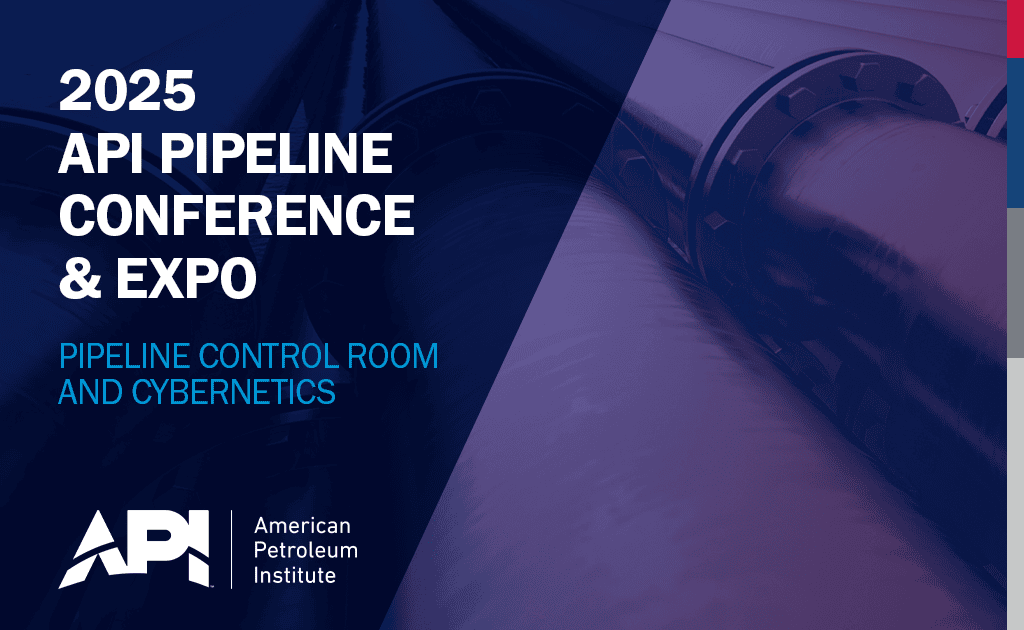
2025 API Pipeline Conference and Expo: Pipeline, Control Room and Cybernetics April 28 – April 30 – Austin
Overview
Join the API 2025 Pipeline Conference and Expo: Pipeline, Control Room and Cybernetics, April 28-30 in Austin, Texas. This is your opportunity to connect with over 800 industry professionals to expand your knowledge, network, learning, and discovery of solutions for you and your organization.
- Gain unique access to over 100 diverse sessions
- Present ideas and work while getting feedback and potentially new perspectives from others for continuous improvement
- Acquire insights into the latest trends and technologies that are crucial for a successful business.
- Meet industry leaders with an opportunity to listen to them present their stories and network with them individually
We look forward to seeing you in Austin!
2025 Theme: Just Good Business
The era of transformative change is reshaping the competitive landscape for all – resulting in a window of vast opportunities and risks across the value chain. The imperative for what will shape good business going forward rests upon the ability to rightly order our energy toward meeting the diverse needs of all customers. Join us as we continue to redefine business to optimize efficiency for affordable access, manage the rapid innovation pace within responsible risk thresholds, and lead through social realities of our diverse communities. This multidimensional period will require hyper focus, unified leadership and Just Good Business in areas of operations, technology, and divergent geopolitical approaches and priorities. Those who opt-out during this inflection period will risk falling short in the long game of securing our energy future.
The Conference Agenda will consist of general sessions, track sessions, and conference events. Each will have visual aids to enhance the attendees ability to match their interest and preferences. This may be indicated through color and/or symbology.
Stakeholder Engagement & Outreach
This track fosters information sharing on engagement information for community involvement and multi stakeholder efforts or tools used for advancement in safe pipeline operations. Example topics may include leading practices for engagement with communities throughout the lifecycle of a pipeline(s), API Recommended Practices (RP) 1162, Public Awareness Programs for Pipeline Operators and RP 1185, Pipeline Public Engagement, environmental justice and Tribal/First Nation considerations, emergency responder education, and damage prevention outreach.
Operational Excellence
This track explores how oil and gas pipeline leaders are operating their assets safely, reliably, sustainably and cost effectively from safety performance improvements to best-in-class standards and systems. Example topics may include processes for identifying high consequence areas, in line inspection lessons learned, pipeline safety management systems, safety culture, Management of Change, leak detection analysis and remediation for risk reduction for assets, operational, and enterprise risk management.
Environmental, Social & Governance
This track provides industry insights on both current and forward-looking strategies, changes, and approaches to environmental responsibility and broader ESG measures. Examples topics may include energy evolution, habitat management and conservation programs, ESG risks, system hardening and resiliency, methane emission quantification and other sustainable practices by operators.
Technology & Innovation
This track highlights operational technologies, tools and other innovations that allow organizations to advance their operations, asset integrity, risk management, and business continuity and growth. Example topics may include new inspection tools and engineering practices, leak detection technologies, emergency responder applications and emerging fuel developments.
Workforce Development
This track offers insight into diverse workforce development strategies in the pipeline industry. Example topics include succession planning to support knowledge transfer, attracting new workers to the industry, talent retention strategies, managing a multigenerational workforce, Operator Qualification (OQ) and inspector certification programs, establishing competency based learning programs, using technology to train, and expanding formal training to include knowledge-based workers.
Low Carbon Energy Outlook
This track explores the topics associated with the safe and efficient transportation and storage of carbon dioxide (CO2), hydrogen (H2) and other low carbon and renewable sources while examining how both new and existing energy pipeline infrastructure may enable the addition of a next generation of low carbon fuel supply. Example topics include safety related R&D, standards to address operations and integrity, odorant considerations, leak detection methods, self-powering technologies, pipeline materials, emergency preparedness and response guidance, dispersion modeling and modifications to infrastructure and other factors to ensure safe operations of CO2 and low carbon fuels.
NEW! Construction
This track offers a forum to share best practices, discuss challenges, and communicate lessons learned during construction activities that occur over the lifecycle of pipeline assets. Example topics include project management (including scope, schedule, supply chain, quality, safety, environment, and cost management), new construction, commissioning, and major maintenance activities such as API 653 tank inspections and integrity remediation projects. Presentations from companies issuing contracts, as well as contracting organizations performing work are welcome.
Cybernetics – Leak Detection
This track aims to showcase emerging technologies and advancements for leak detection systems. Example topics may include uses cases in areas of internal and/or external leak detection systems, detection accuracy and proactive maintenance, new implementations in live environments, predictive analytics, smart algorithms, inventive applications of detection tools, and next level improvements to existing technologies.
Cybernetics- SCADA/Cybersecurity
This track provides information about key industry improvements to SCADA and other OT systems from processes to technologies and explores topics related to the latest advancements, challenges and strategies for securing critical energy infrastructure. Example topics may include the modernization of SCADA/OT communications, audit experiences, case studies in secure and efficient inter-company connections, SCADA/OT related projects and lessons learned, strategies for threat detection and prevention, vulnerabilities and solutions for ICS and SCADA systems, and case studies for risk management approaches.
Control Room Management
This track focuses on control room management efforts from how stakeholders are addressing challenges related to implementation of an alarm philosophy and fulfillment of regulations requiring an alarm management plan to interpretations of the Control Room Management Rule through the operational application of procedures and practices. Example topics may include controller response on complex systems, smart alarms, alarm dashboarding and analysis, impacts of Title 49 rupture response procedures, manual operations, workload management, lessons learned from case studies, and regulatory inspection or compliance activities.
NEW! Artificial Intelligence
Artificial Intelligence (AI) encompasses a range of technologies that enable machines to mimic human intelligence, including learning, reasoning, and problem- solving. This track explores the application of AI in the petroleum industry to optimize operations, enhance safety, and improve efficiency.


